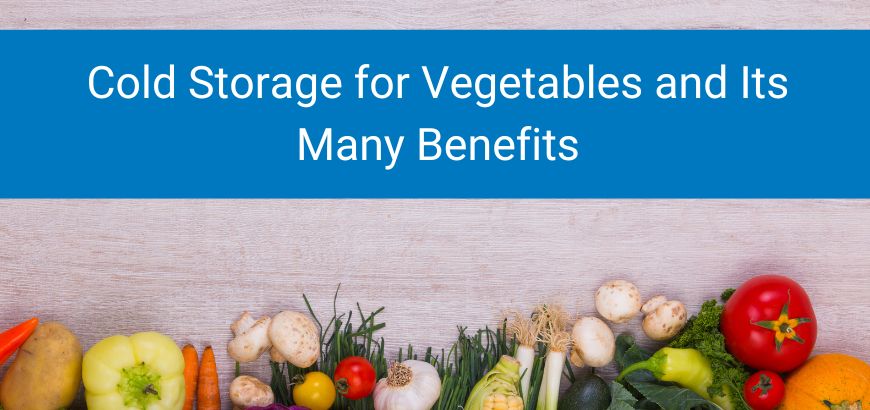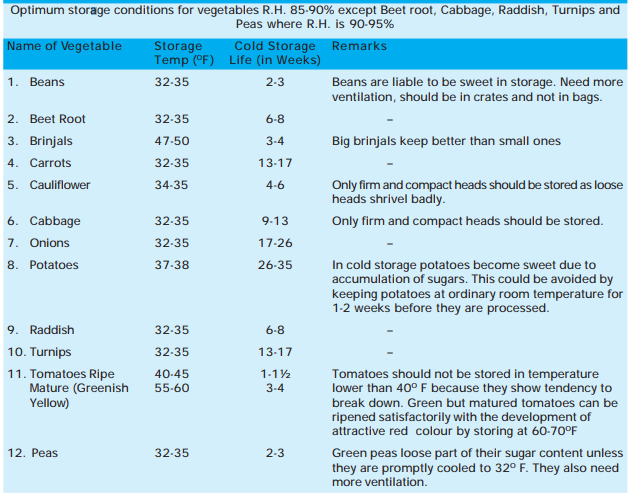Cold Storage for Vegetables and Its Many Benefits

Admin
September 3, 2022


September 3, 2022

It comes as no surprise that India ranks second in the production of fruits and vegetables after China. During 2020-21, India produced 200.45 million MT of vegetables and 102.48 million MT of fruits. Production is actually on the rise due to diverse agro-climatic conditions for vegetables and improved packaging practices. However, the shortage of cold storage for vegetables poses some hurdles in tapping the true production value. Currently, cold storage facilities are mostly used for a single commodity such as apples, flowers, potatoes, oranges, grapes, etc., resulting in poor capacity utilization.
With that being said, cold storage has been a game-changer in prolonging the shelf-life of fruits and vegetables. It has primarily helped overcome critical problems such as price fluctuations, market gluts, high marketing prices, etc. In fact, the benefits of cold storage for vegetables are not just limited to these. So, let us dive deeper!
Cold storage facilities are a critical infrastructural requirement for fruits, vegetables, and other perishable commodities. Offering advantages to both farmers and consumers, cold storage has helped stabilise market prices and manage distribution in terms of both demand and time. It also helps farmers capitalise and get attractive prices on cash crops. Plus, it means that consumers also get a consistent supply of perishable fruits and vegetables along with lower price volatility.
Refrigerated storage helps avoid:

Here are some of the key benefits of storing vegetables in cold storage.
Reduced deterioration and wastage
Post-harvest, during cleaning, pre-cooling, transportation, and storage, vegetables should be handled carefully to avoid wounds or damage to the skin. When the perishable items are not stored under appropriate conditions they are prone to diseases, infection, dehydration, respiration, weight loss, and deterioration. Cold storage provides the right temperature and humidity levels so that chemical and physiological changes in post-harvest produce are under control, extending shelf-life and maintaining the texture and flavour till they reach the marketplace.
Inappropriate storage conditions mean a high risk of the growth of microorganisms including mold, yeast, bacteria, etc. Such infected perishable items when consumed can be potentially harmful when consumed.
Cold storage maintains the temperature at lower levels, thus, preventing the growth of microbes and keeping the perishables safe.
Cold storage rooms offer flexibility in terms of capacity as well as temperature and humidity controls. This means that based on your requirement and product type, you can choose from a variety of cold storage for vegetables. You can customise it to the level of selecting the type of refrigeration system, air circulation, racking system, modular construction, lighting, storage capacity, and much more.
Handling and storing large quantities of perishable goods is a challenge but it becomes more tricky when the items are temperature sensitive. Especially, in the retail setting, such items may take up a lot of space. Moreover, using a refrigeration system at a retail store is not a cost-effective and efficient long-term option. That is why cold storage for vegetables is a viable, one-stop solution before products reach the end customers through shops or retail stores. It also helps maintain inventory and prolong the shelf-life of produce under appropriate storage conditions.
There is always a risk of power outages and that is why cold storage facilities are equipped with power backup capabilities to ensure storage conditions remain consistent without fail. Additionally, being airtight, these structures are better equipped to maintain cooler temperatures for an extended time.
Easy accessibility is also an added advantage. With the right racking or shelving solutions and pallet systems, you can make effective utilization of space, especially in multi-commodity cold storage warehouses. You can also consider using free-standing storage racks that can be moved in and out depending on your storage needs.
Farmers and traders face huge losses when the vegetables are spoiled due to inappropriate storage conditions. Cold storage prevents this problem, extends shelf-life, and maintains quality, texture, and flavour, ensuring both producers and traders get the maximum ROI on the harvest.
Moreover, choosing cold storage with eco-friendly, energy-efficient refrigeration systems can help you save money on energy bills and maintenance.
For temperature-sensitive perishable fruits and vegetables, logistics play a critical role. Before transporting items to distributors and customers, it is important that they be stored in appropriate conditions. Moreover, reefer trucks and the route and duration they take to ensure the overall safety and quality of the produce can impact the margins.
Based on the type of commodity, storage requirements, and duration, cold storage can be of the following types.
There is strong growth in the market for fresh produce including fruits and vegetables. This warrants the need for increased investment in cold storage infrastructure which can offer numerous advantages to farmers, distributors, as well as consumers.
Rinac, a global leader in cold storage solutions and processes has helped farmers and businesses both with custom cold storage solutions to help them reap maximum benefits. To know more about cold storage for vegetables, get in touch with us today!
